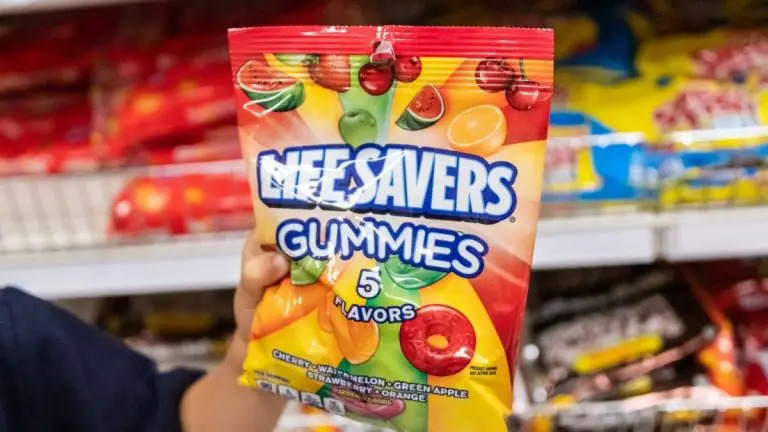Answer: It depends. Lifesavers Mints and Hard Candies are most likely vegan-friendly while Lifesavers Gummies aren’t because they contain gelatin.

Are Lifesavers Vegan?
With veganism on the rise exponentially, the question now is, are Lifesavers vegan? Read on ahead to find out everything you need to know about Lifesavers!
Some Lifesavers contain ingredients that are not vegan-friendly. It is a tricky situation – I will uncover all that you need to know about Lifesavers and their ingredients.
What Are Lifesavers?
Lifesavers were first produced in 1912 by a chocolate candy maker named Clarence Crane. Crane seeks an alternative to chocolate, something that would not melt during the hot summer as chocolate would do. This birthed Lifesavers as a brand, which he named “summer body.” As time passed, the candy’s shape was changed to resemble a customary ring-style life preserver, also known as Lifesaver.
Initially, Lifesavers only came in peppermint flavor. After the rights were sold in 1913 to a New York candy manufacturer, the packaging changed to preserve the candy better. Over the years, various mints and flavors of sweets became famous for their unique packing and branding in paper-wrapped tinfoil rolls.
What Are Lifesavers Made Of?
Lifesavers are made of various ingredients. The primary components involved in the production of lifesavers are sugar, palm oil, artificial color, and natural flavors. Read along to have a better understanding of these ingredients.
Sugar: Sugar is understood to be a general name for sweet-tasting and dissolvable carbs. In the case of sugar, it is the production process that validates if it is vegan-friendly. The sugar beet production process has no animal-based products involved in it. Hence, sugar beet is vegan-friendly.
On the other hand, the production process of sugar cane involves animal-based products. Refineries turn brown sugar into table sugar using a filter made from bone char, burnt-up animal bones. In these terms, cane sugar is considered non-vegan.
There are also other varieties of sugar – coconut sugar and powdered sugar. However, the most important thing to know about sugar is that all sugar, excluding refined cane sugar, is expected to be vegan-friendly. Also, for vegan sugar brands, if the packaging indicates that it is organic, unrefined, natural, or raw, there is a high chance of it being vegan.
Palm Oil: It is considered vegan because of its plant-based source. It is plant-based because it comes from the fruit of oil palms. Palm oil appears to be an entirely plant-based product, but controversies originate from the fact that the entire process of producing palm oil has environmental implications.
The production method starting from palm oil growth is believed to be destructive to nature and environmental conditions as it aids deforestation and loss of natural habitats.
Even though they are aware that palm oil is 100% plant-based, vegans seem to shy away from taking products that contain palm oil due to the environmental and natural impact of the production process. These factors influence vegans as they tend to consume a vegan-based diet that preserves natural habitats and ecological conditions and, at the same time, still improves their health and well-being.
Artificial Colors: Food coloring is vegan as it is extracted from plants. However, there is an exception in carmine, which is not made from plants but from bugs. However, artificial colors are predominantly present in most foods. The three most crucial synthetic food colorings are red 40, yellow 5, and yellow 6.
Natural And Artificial Flavoring: Natural flavors can be from both animals and plants, but flavors in candy usually come from plants. Natural flavors from animal sources would usually be made known. The specific component of natural taste and artificial flavor is that natural flavors come from plants and animals, and artificial flavors are from human-made substances, usually produced in the lab.
Natural flavors are safe for consumption by vegans because most of the natural flavors come from plants. However, knowing which flavor is vegan-friendly and not vegan-friendly appears difficult because the FDA forbids companies from exposing these ingredients. Contacting the manufacturer directly is the best strategy.
Types of Lifesavers
Lifesavers Mints: Lifesavers mints contain sugars and colors, and they also have a particular ingredient called stearic acid. Stearic acid can come from plant-based sources or animal-based sources and can also be produced synthetically. Manufacturers of Lifesavers Mints in recent times have drifted to using only plant-based sources for their stearic acid.
High fructose corn syrup, artificial flavors, corn syrup, and dextrose are other ingredients involved in the making of Lifesavers Mints. It is safe to say that Lifesavers Mints are vegan-friendly.
Lifesavers Hard Candy: Lifesavers Hard Candy is vegan-friendly as they do not contain any animal-based ingredients.
Lifesavers Gummies and Their Vegan Status in 2025: Are Lifesavers Vegan?
If you’re wondering, “Are Lifesavers vegan?” it’s important to know that Lifesavers Gummies contain gelatin, a key ingredient derived from the skins, bones, tendons, and ligaments of animals—mainly cows and pigs. Because gelatin is the primary component, these gummies are not considered vegan. Besides gelatin, the ingredients list includes sugar, water, modified corn starch, mineral oils, corn syrup, carnauba wax, natural and artificial flavors, and colorings such as Red 40, Yellow 5, and Blue 1. There’s also a small amount of citric acid, but this doesn’t affect their vegan status. So, as of 2025, Lifesavers Gummies remain unsuitable for those following a vegan lifestyle.
Conclusion
In summary, Lifesavers Mints are most likely vegan based on the idea that most manufacturers use plant-based stearic acid in the production process. Lifesavers Hard Candies are vegan-friendly as all the ingredients involved are not animal-based, and Lifesavers Gummies, due to the presence of gelatin, aren’t vegan.




